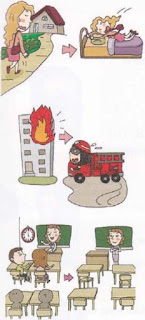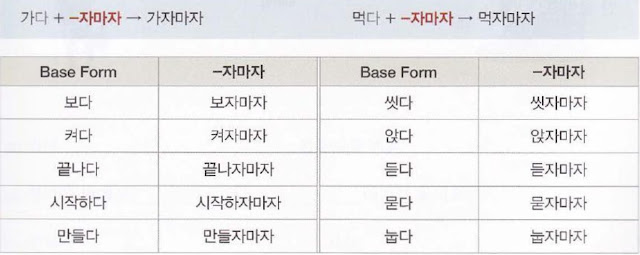 너무 피곤해서 집에 오자마자 잤어요.
너무 피곤해서 집에 오자마자 잤어요.
I was so tired I went to sleep as soon as I got home.
불이 나자마자 소방차가 왔어요.
The fire truck arrived as soon as the fire started.
수업이 끝나자마자 학생들은 교실을 나갔어요.
The students left the classroom right after class was over.
Grammar Focus:
-자마자 indicates that something occurs immediately following the end of some event or action. It is added to the verb and means ‘as soon as’ or ‘right after’ in English.

The subjects of the first and second clauses of the sentence can be either the same or different.
• (내가) 집에 오자마자 (내가) 잤어요.
As soon as I arrived home, I slept.
• 엄마가 나가자마자 아기가 울어요.
As soon as the mother leaves, the baby starts crying.
Tense is not expressed in the verb of the first clause, but it is in the second.
• 집에 갔자마자 잤어요. (X)
->집에 가자마자 잤어요. (〇)
As soon as I got home, I slept.
• 집에 갈 거자자마자 잘 거예요. (X)
->집에 가자마자 잘 거예요. (〇)
As soon as I get home, I’m going to sleep.
Conversation:
A: 정아 씨와 언제 결혼할 거예요?
When will you marry Jeonga?
B: 대학교를 졸업하자마자 결혼할 거예요.
We’ll get married as soon as we graduate from college.
A: 오늘 왜 기분이 안 좋아요?
Why are you in a bad mood today?
B: 어제 우산을 샀어요. 그런데 우산을 사자마자 잃어버렸어요.
I bought an umbrella yesterday. But I lost it as soon as I bought it.
A: 배가 너무 불러요. 누워서 좀 자고 싶어요.
I’m so full. I want to lie down and go to sleep.
B: 밥을 먹자마자 누우면 건강에 안 좋아요.
It’s not good for your health if you lie down right after eating.
